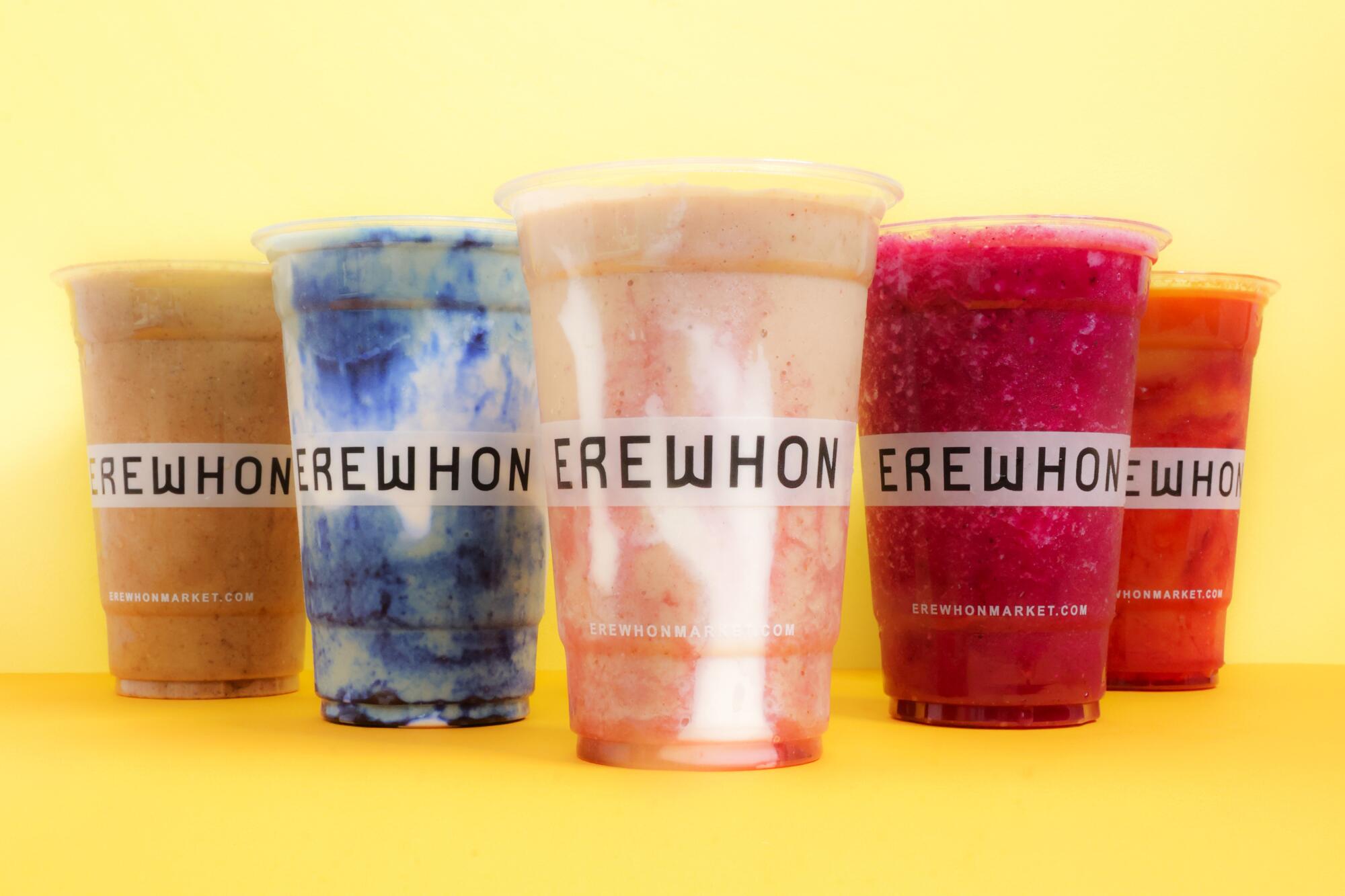
There’s something a bit too on-the-nose about Los Angeles’ trendiest health food store being called Erewhon. The 1872 Samuel Butler novel that inspired the store’s name satirizes a utopia in which those in ill health are treated like criminals, and money confers prestige but is functionally meaningless. You’ll certainly leave Erewhon feeling like money has no meaning in a place where it costs $200 to simply join the rewards program.
And yet, there’s an undeniable appeal. Mountains of shiny, colorful produce and shelves packed with product names like “Arrae” and “Lakanto.” Immaculate rows of bottled juices and perfectly geometric, color-coordinated product displays that gently whisper, “recreational stimulants.” Lithe, Pilates-toned bodies slithering around the store that leave you fantasizing that you too could one day belong. Somehow, heartbreak feels good in a place like this.
Each of Erewhon’s seven locations has a tonic bar that serves a variety of smoothies, which are the subject of today’s investigation. My research? I tried every smoothie on the menu, minus the make-your-own smoothies and including Hailey Bieber’s $17 Strawberry Glaze Skin Smoothie, launched around the same time as her skincare line, Rhode.

Subscribers get exclusive access to this story
We’re offering L.A. Times subscribers special access to our best journalism. Thank you for your support.
Skincare is a popular space for celebrities and influencers — one in which I hold a certain amount of cynicism. Does a $575 Kardashian regimen make your skin 50 times clearer and more supple than a $10 bottle of Cetaphil and a basic moisturizer? Maybe not.
So I was pleasantly surprised to discover that Bieber’s smoothie is … pretty good. It’s actually very good. It’s thick, creamy, has plenty of strawberry flavor, courtesy of Harry’s Berries, and occasional date chunks impart great texture and natural sweetness. But will it make your skin better? No comment.
The results of my smoothie tasting — on which I spent just shy of $300, plus gratuity — are grouped into ones I liked, ones I was neutral on and ones that needed a little work — OK, sometimes a lot of work.
Let’s get started:
The Best of the Best
Activated
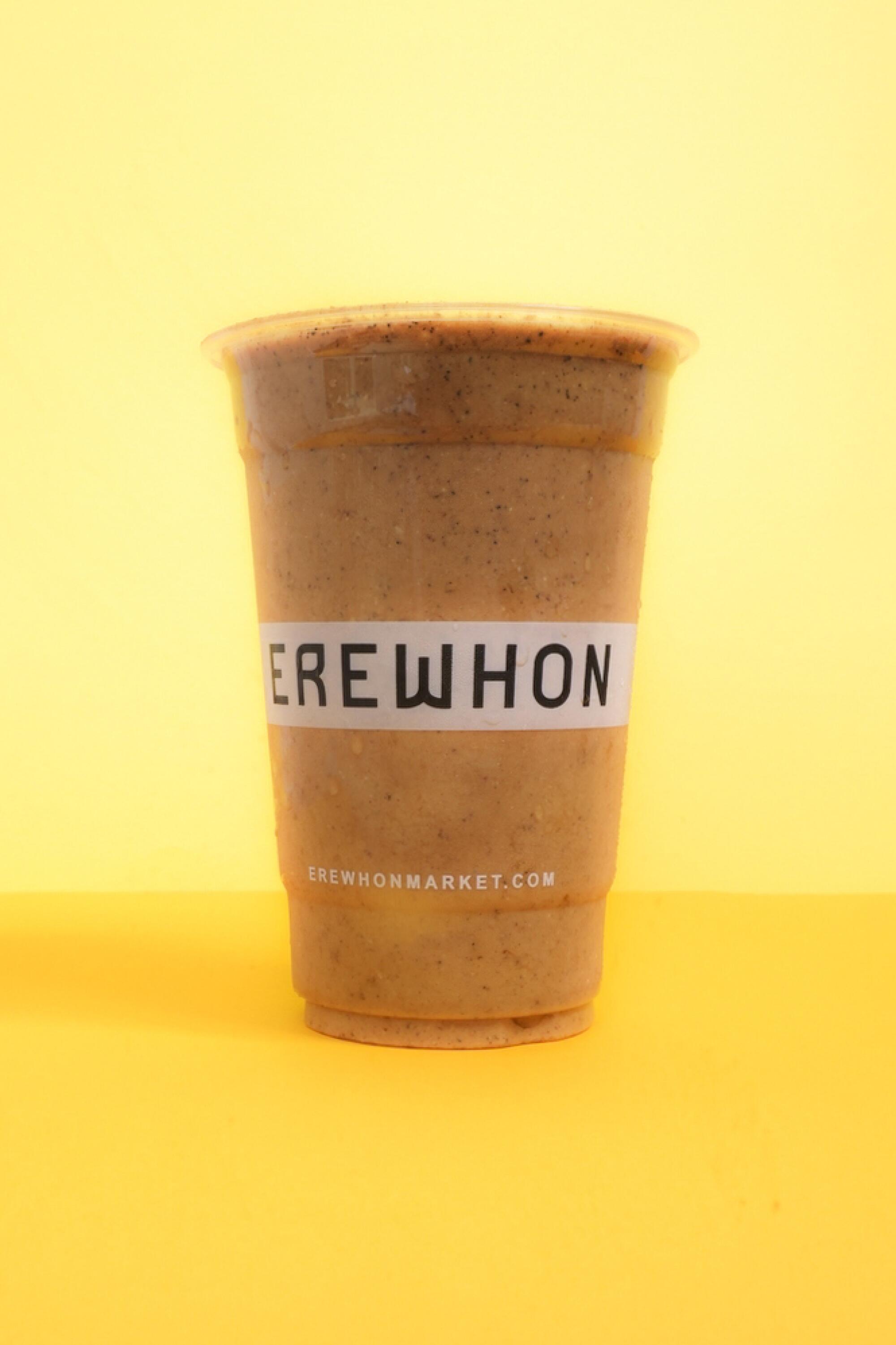
The Activated smoothie tastes mostly of coffee and coconut; It’s a good combo. A pleasing grittiness from cacao nubs and coffee beans is enough to notice but doesn’t overpower. I could get into the idea of drinking one of these every morning but, at $18, I’m not sure I could afford it.
Coconut Cloud
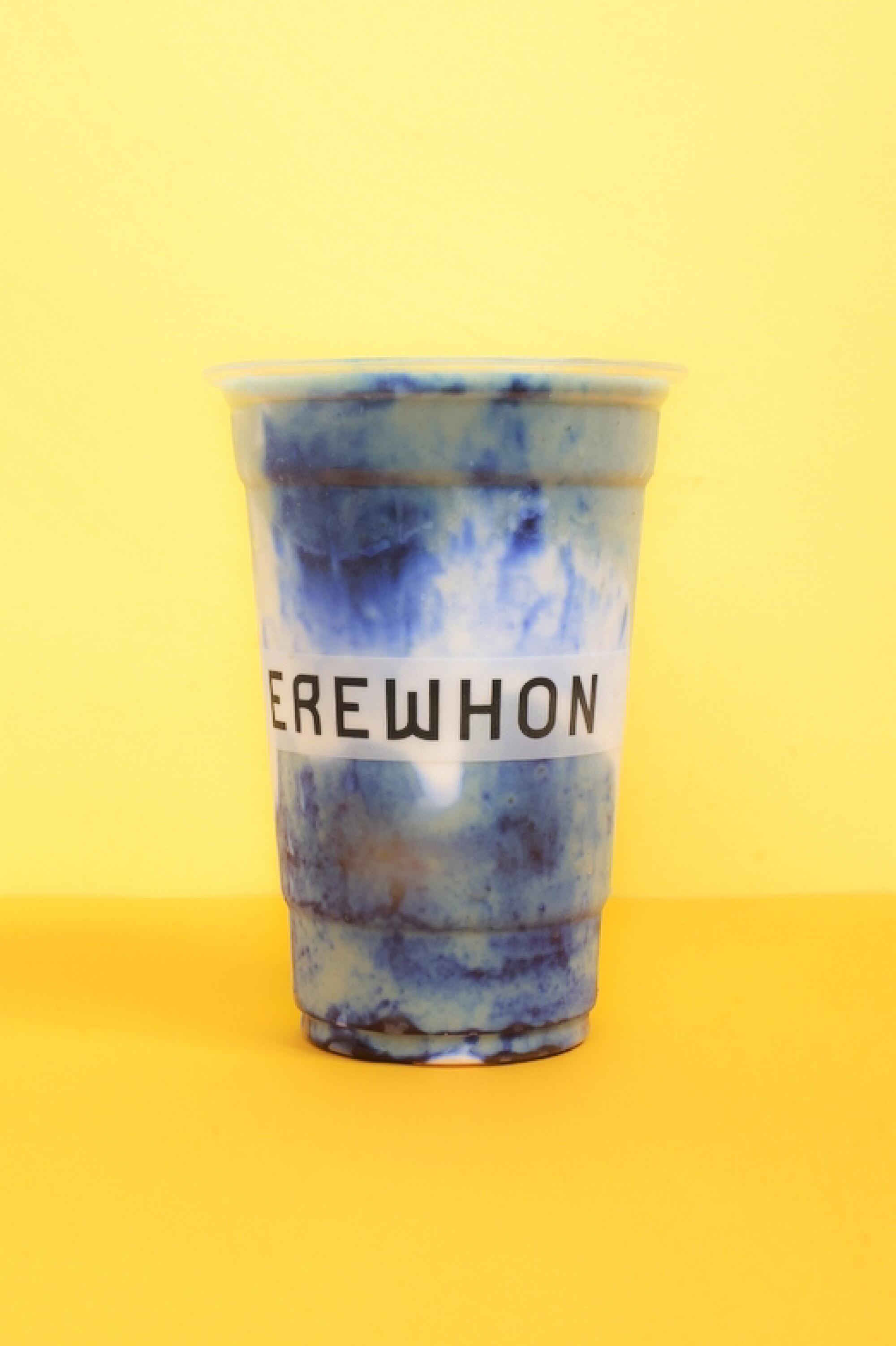
The friendly tonic bartender at the Beverly Boulevard location told me about this off-menu $17 smoothie, and I’m glad he did. (I’d also like to formally apologize to him and everyone in line behind me that day for being That Guy who held up the line and ordered 11 smoothies.)
Banana and vanilla notes complement the thick, whipped coconut cream (the “cloud,” as it were). A deep, swirling cobalt blue background might make you think you’re sipping a cumulus right out of the sky.
Hailey Bieber’s Strawberry Glaze Skin Smoothie
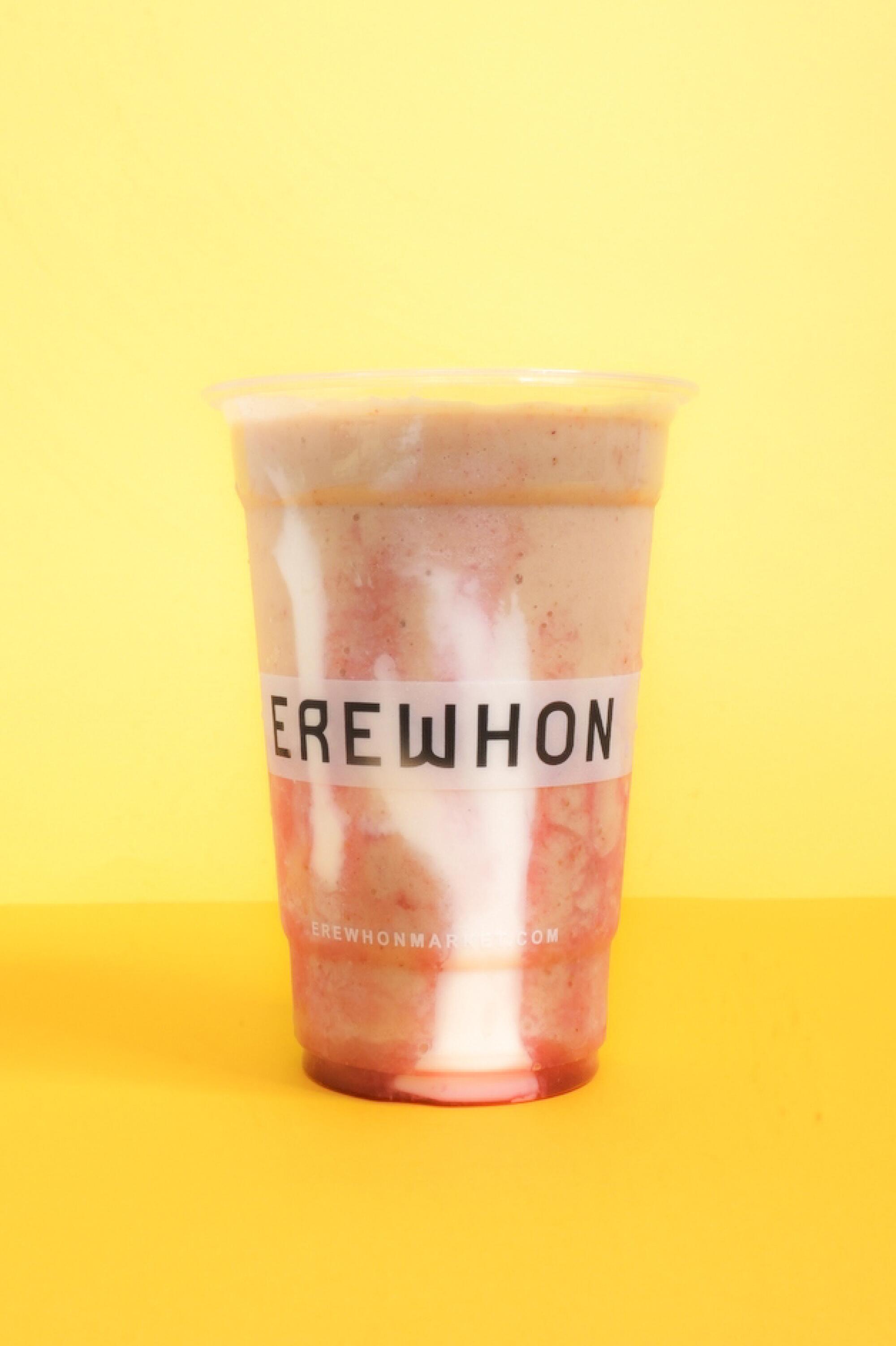
See notes in introduction. It’s good. Is it too late now to say sorry I doubted that?
Pitaya
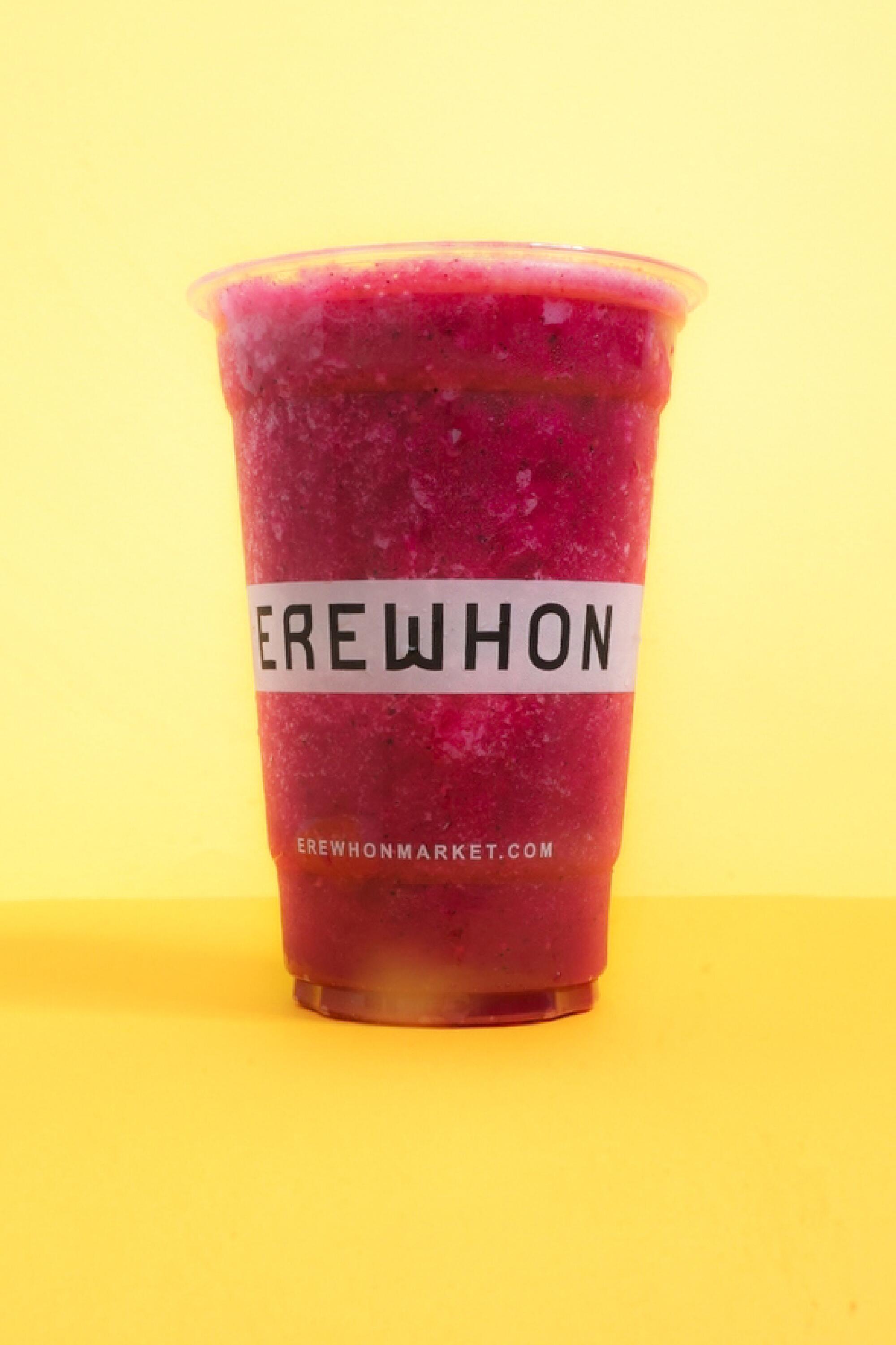
A bright, fruity, slushy smoothie with a fantastic magenta color. Think of it as a cold, drinkable manifestation of dragonfruit. Pitaya is not the most assertive-tasting of the tropical fruits, so you’ll be getting plenty of pineapple flavor in there as well for your $12.
Turmeric Crush
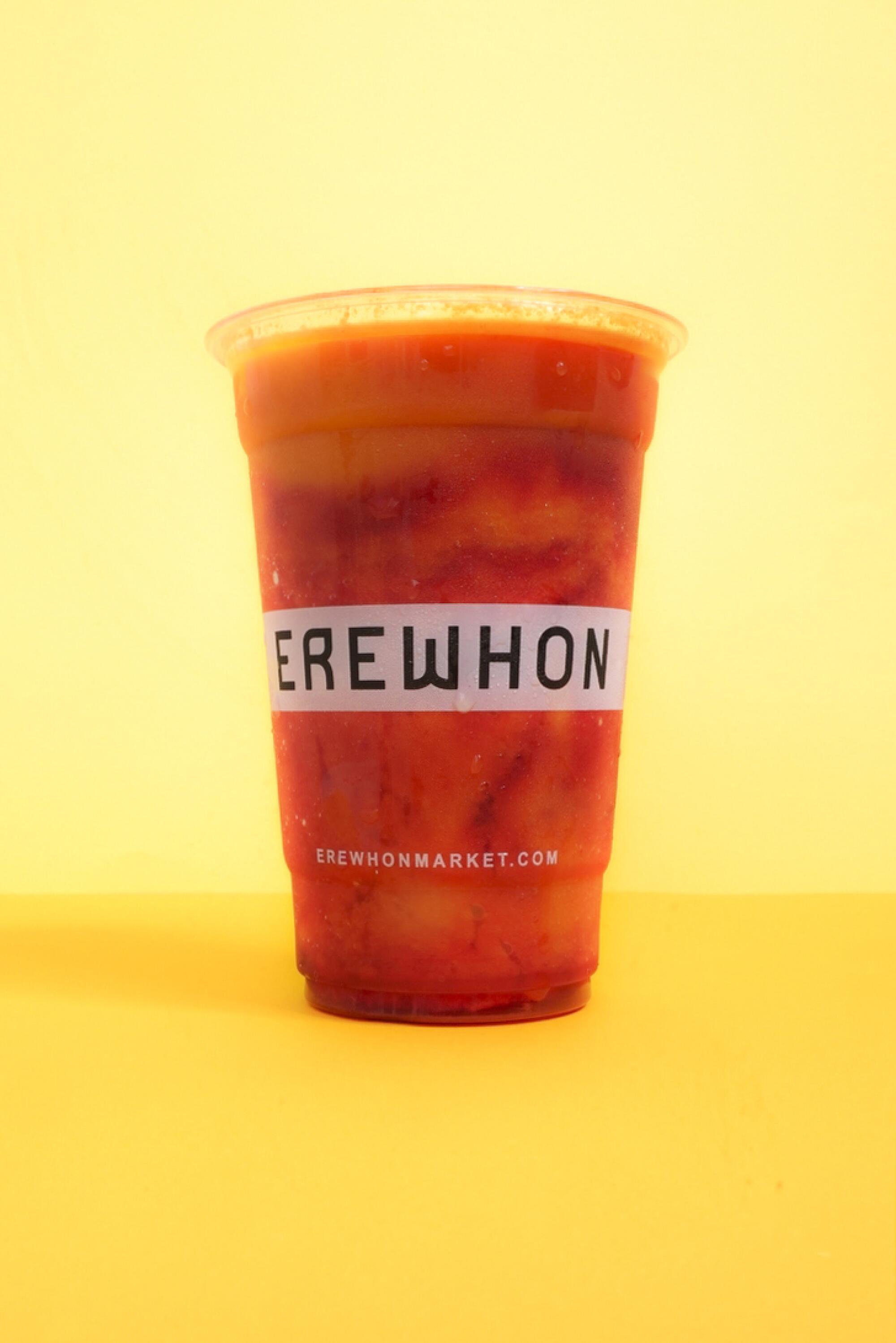
From a purely aesthetic point of view, this is the prettiest of the Erewhon smoothies: a bright, vivid orange with swirly beet-juice streaks that will leave you thinking you bought the $12 smoothie at a Grateful Dead concert. Erewhon is a master of mixing liquids of different densities to get some gorgeous tie-dye effects in its smoothies. The taste is a slightly spicy, earthy carrot-orange juice with a little beet bitterness. It leaves a nice tingle in your mouth — useful if, like me, the events of the last two years have left you mostly dead inside.
The Best of the Rest
Body Ecology
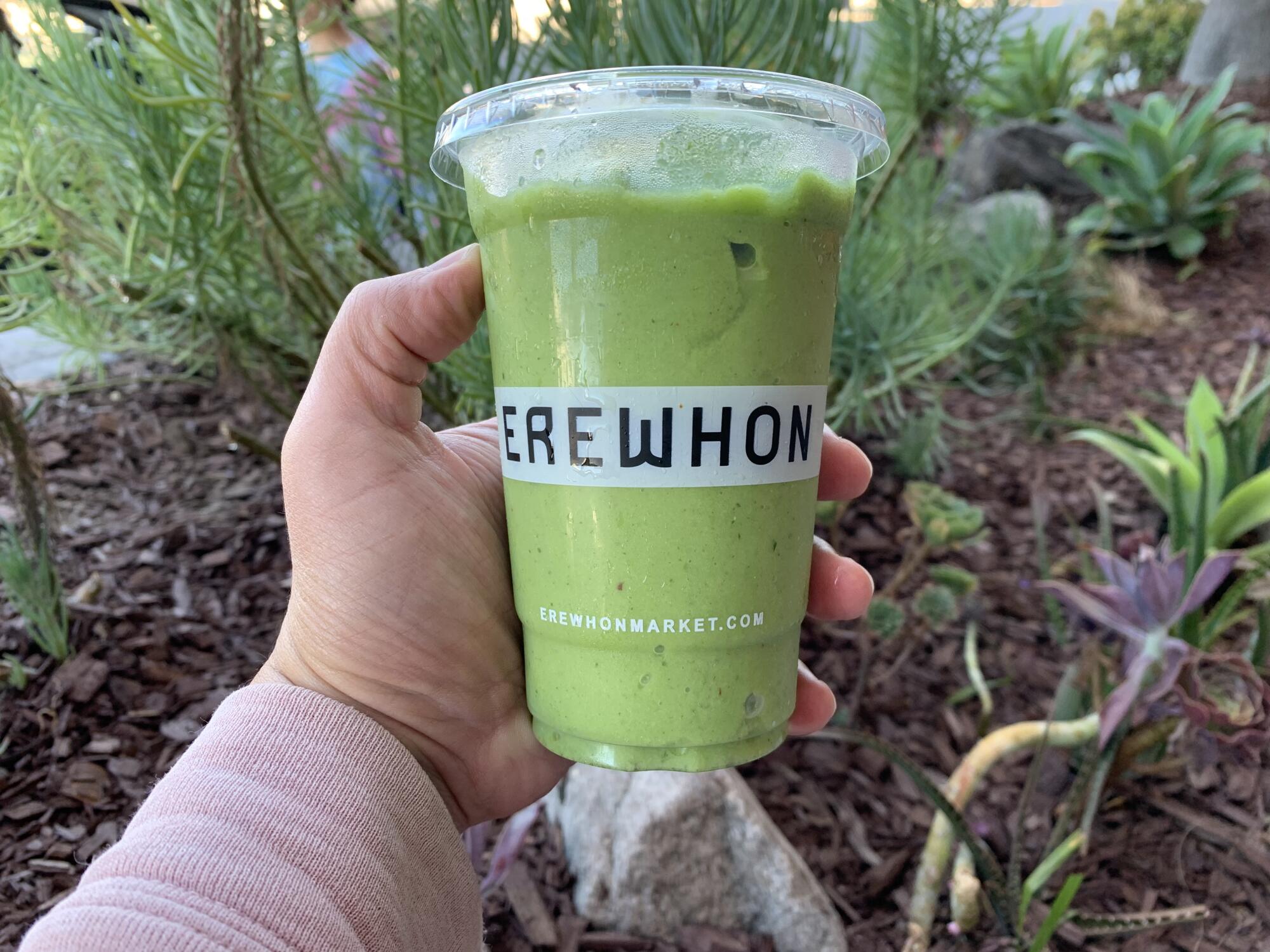
This is fine. Healthy-tasting. It’s the $12 smoothie embodiment of a wheatgrass shot. It tastes like chloroplasts, or whatever those things were you looked for in plant cells through a microscope during biology class — at least, it’s what I imagine they might taste like. Some tanginess from lemon helps cut the greenness.
Brainstorm
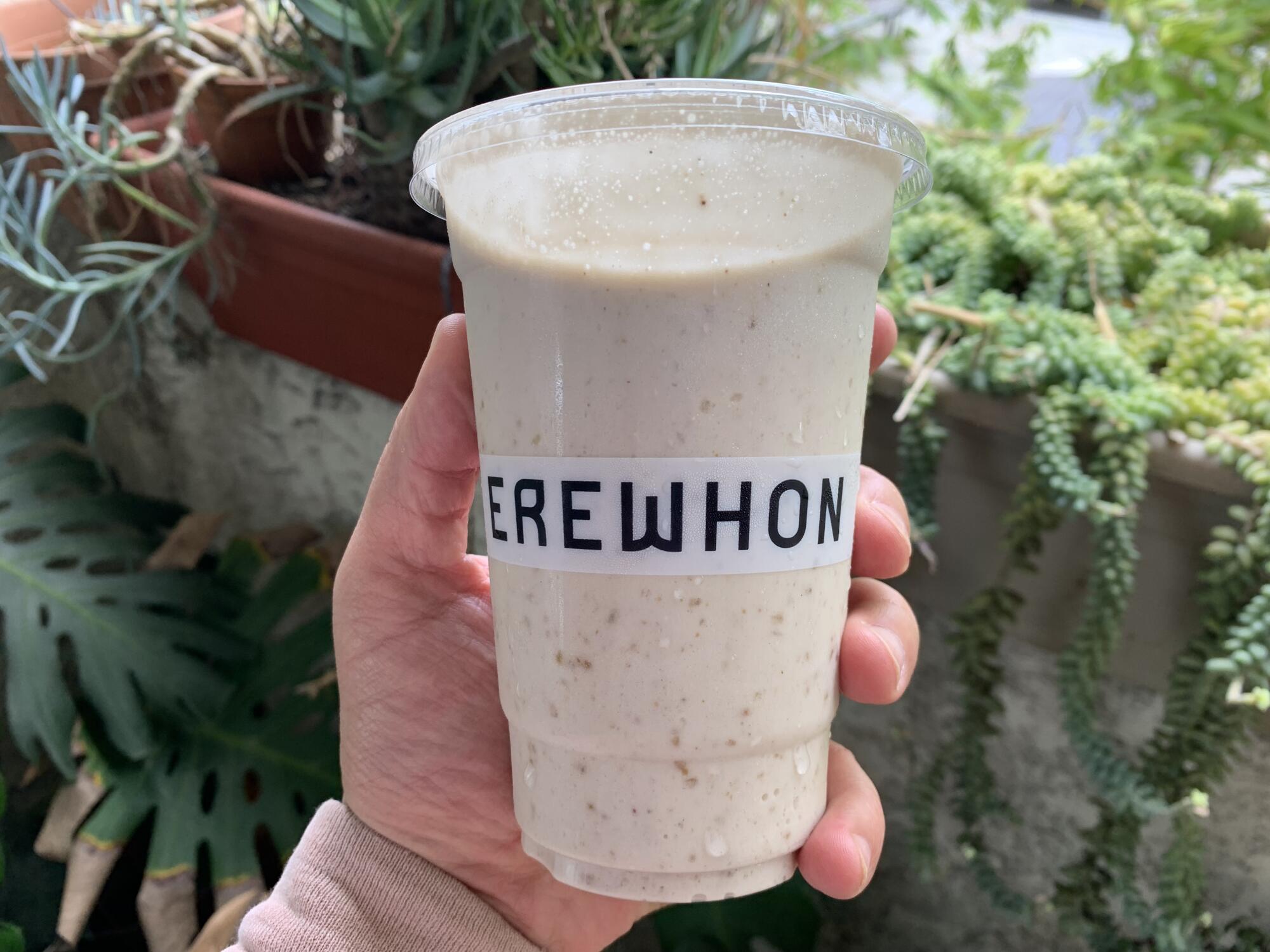
This is just a weaker version of a banana licuado. Whereas your average licuado is usually quite flavorful, this $11 one feels a little flat. The texture is right — thin and milky, easily sipped through a straw — but nothing else pops. There are walnuts and dates but they hardly register.
Coconut Dream
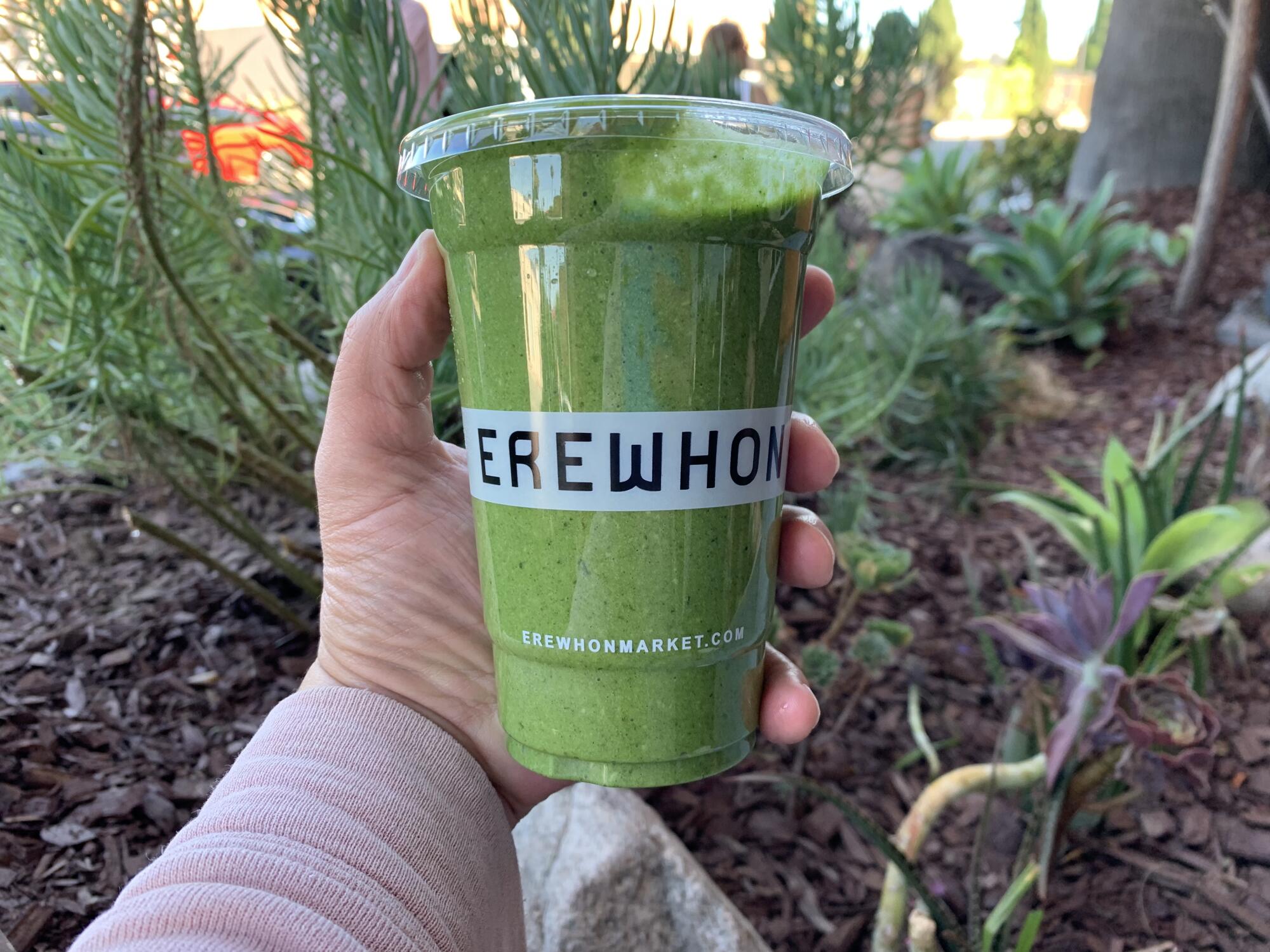
This is one of the few smoothies that wasn’t cold. It’s similar to the Body Ecology above — very green and leafy — but lacks any brightness from the lemon. It’s certainly healthy-tasting; you’ll feel like a cow chewing its cud. Not the most enjoyable, but I suppose you’ll feel good about yourself after having consumed the $12 smoothie.
The Goddess
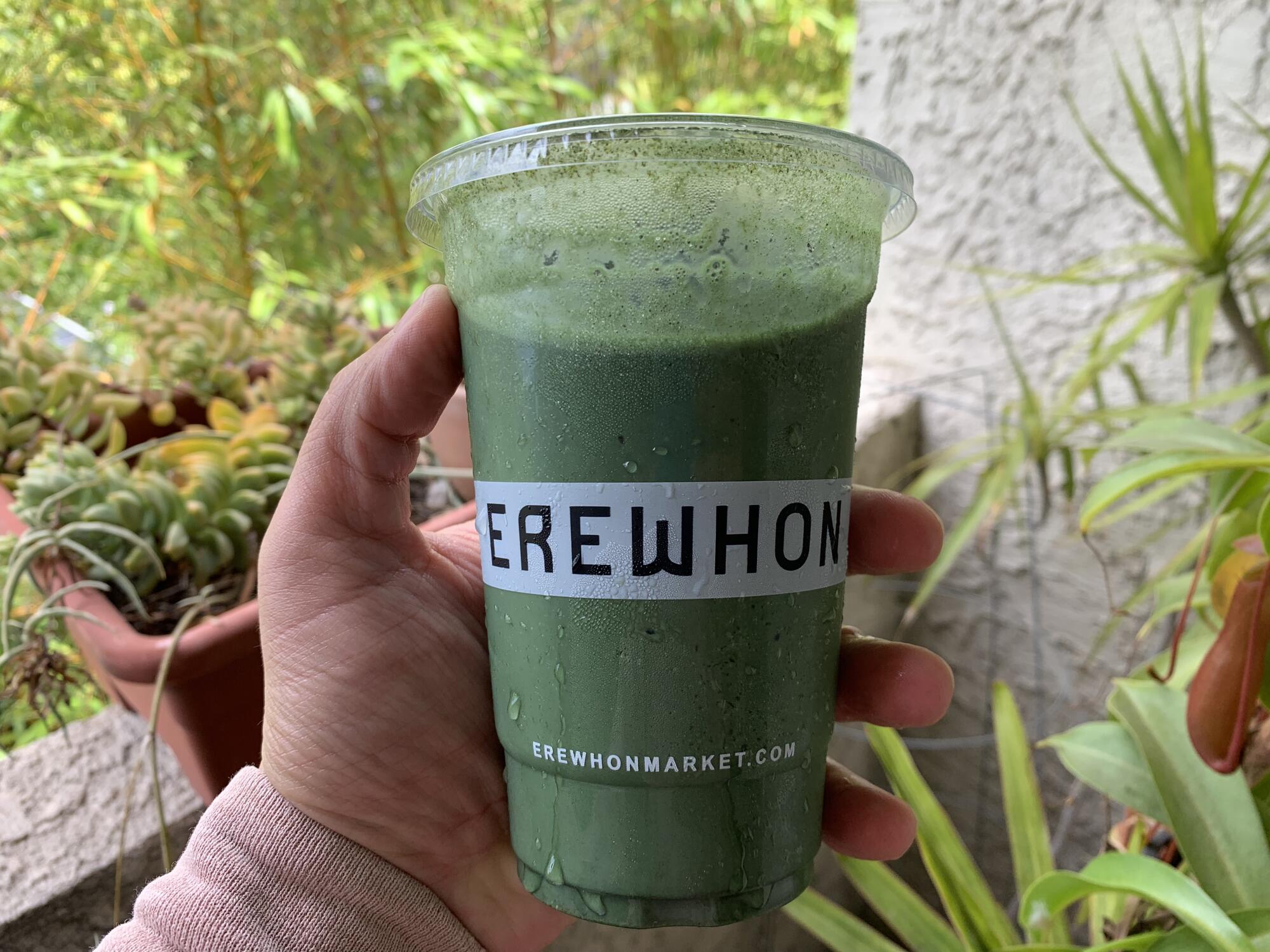
This is called the Goddess, and not the Green Goddess — I suppose that’s for a reason. Despite its deeply mossy appearance, the pricy $18 smoothie doesn’t taste particularly green at all. The hemp seeds and pumpkin seed oil in the smoothie overpower everything else, leaving you with a gritty, seedy-tasting almond milk. It’s not the worst; it’s just not what you might be expecting.
Matchacado
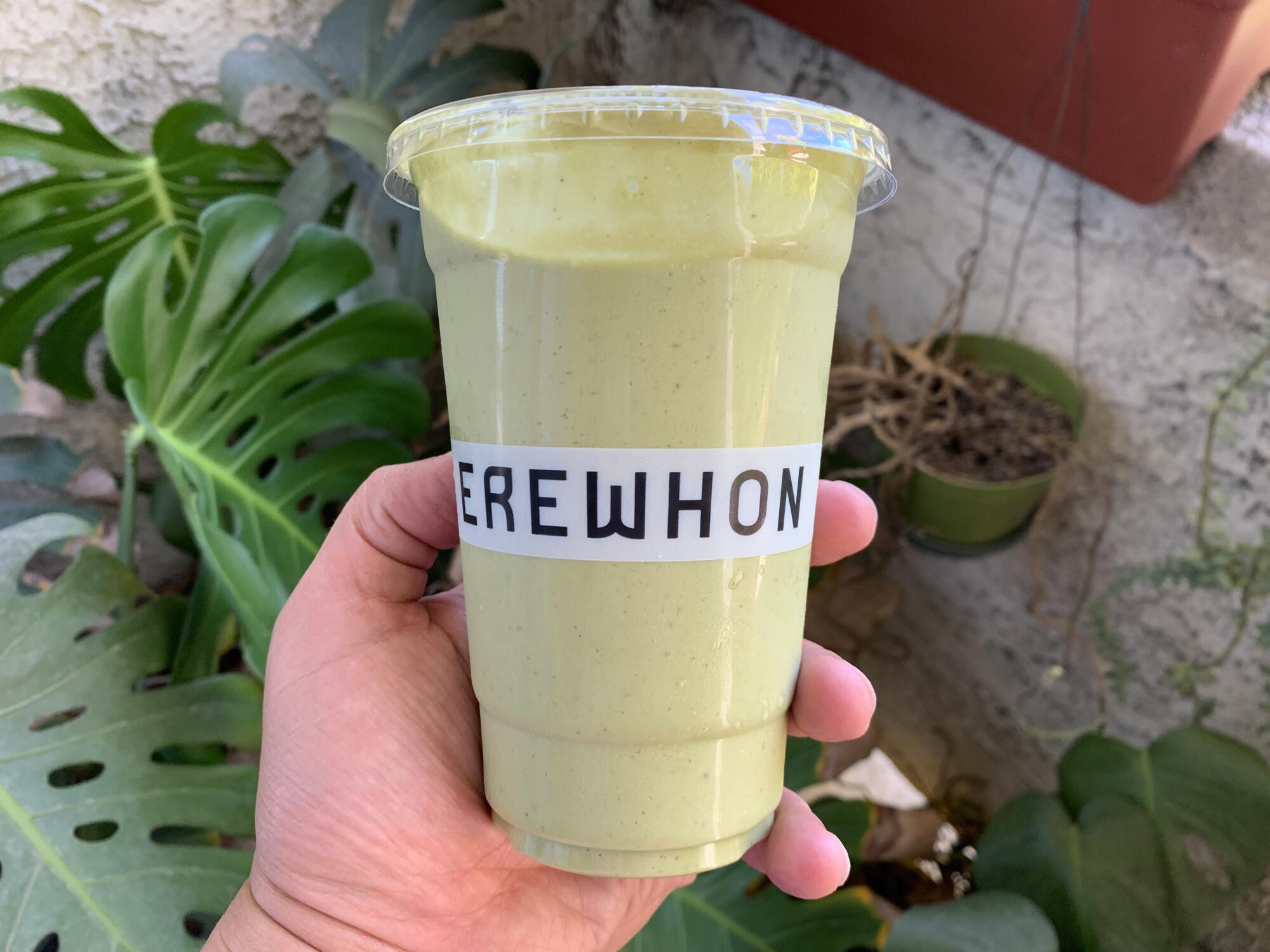
Matcha and avocado might not be the most intuitive combination. It doesn’t completely fail here but banana and avocado, the two dominant flavors/textures in this $16 smoothie, don’t really want to let anyone else join the party. There’s a hint of signature matcha bitterness but it’s so faint it seems more like a mistake, rather than a feature. Go stronger, or don’t go at all.
Mint Pistachio Energizer
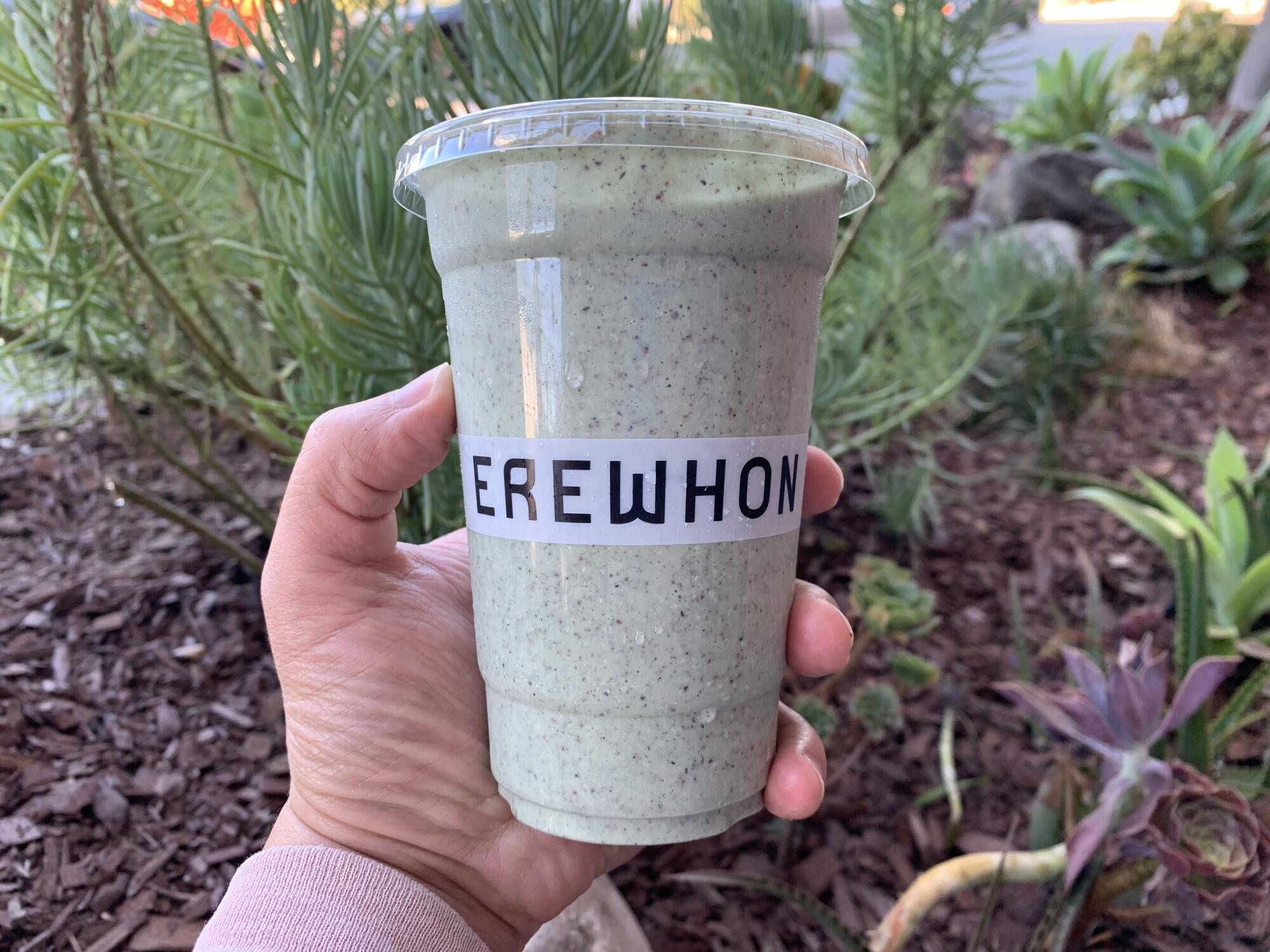
I liked this $17 smoothie overall. It’s pretty sandy and meaty from the blended coconut and pistachios — you’ll definitely have to do some chewing. The pleasing light-green color announces a surprisingly strong mint flavor. Pistachio-mint may not make it into my Mt. Rushmore of favorite flavor combinations, but it’s more good than bad.
Peanut Butter Blast
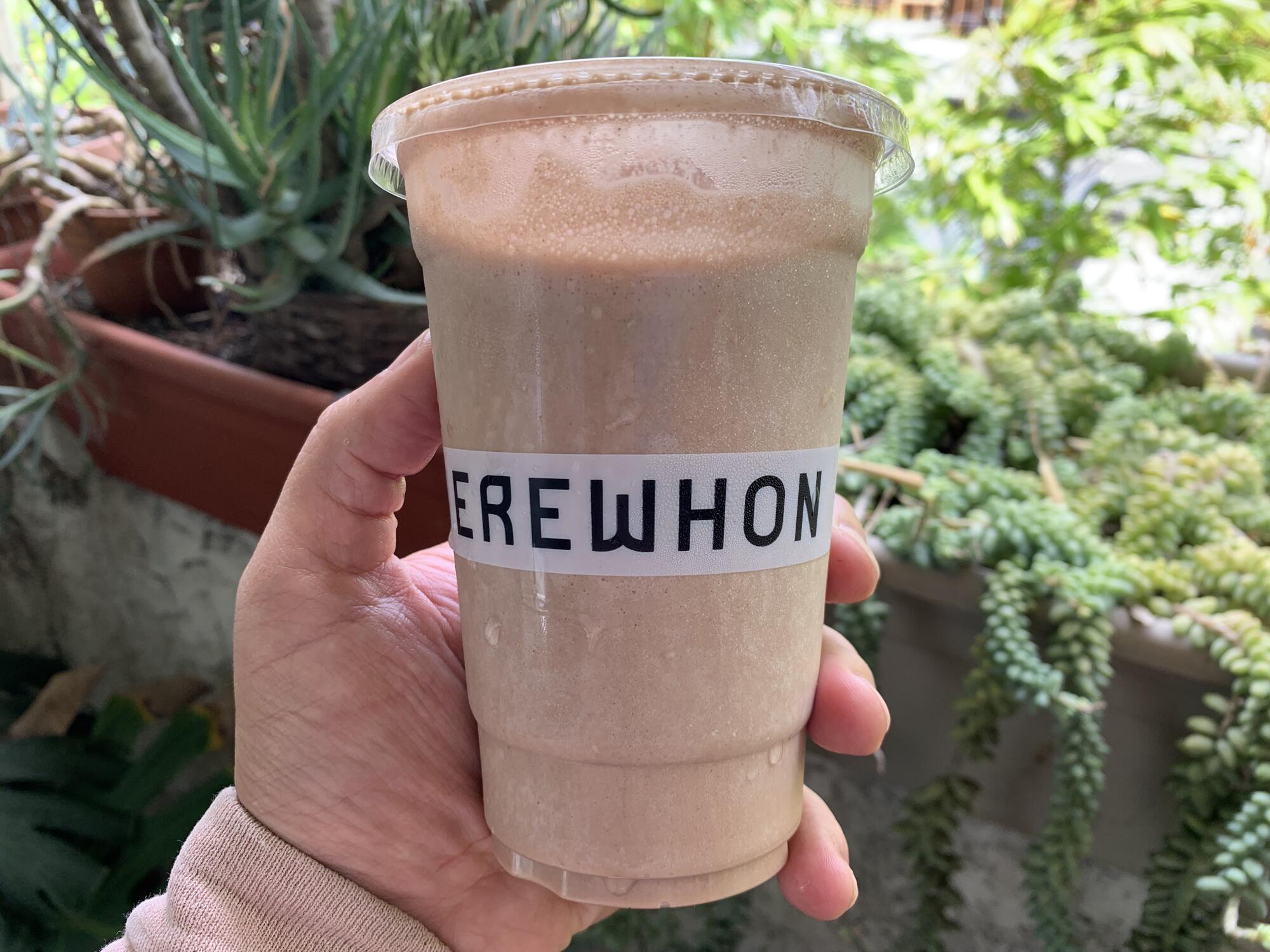
You can’t really go wrong with peanut butter and banana, but this $11 smoothie certainly tries.
It has a soupy, unappealing texture and slight bitterness, possibly from the inclusion of whey protein. Nevertheless, it’s still a concoction that would satisfy Elvis himself.
Royal Defense
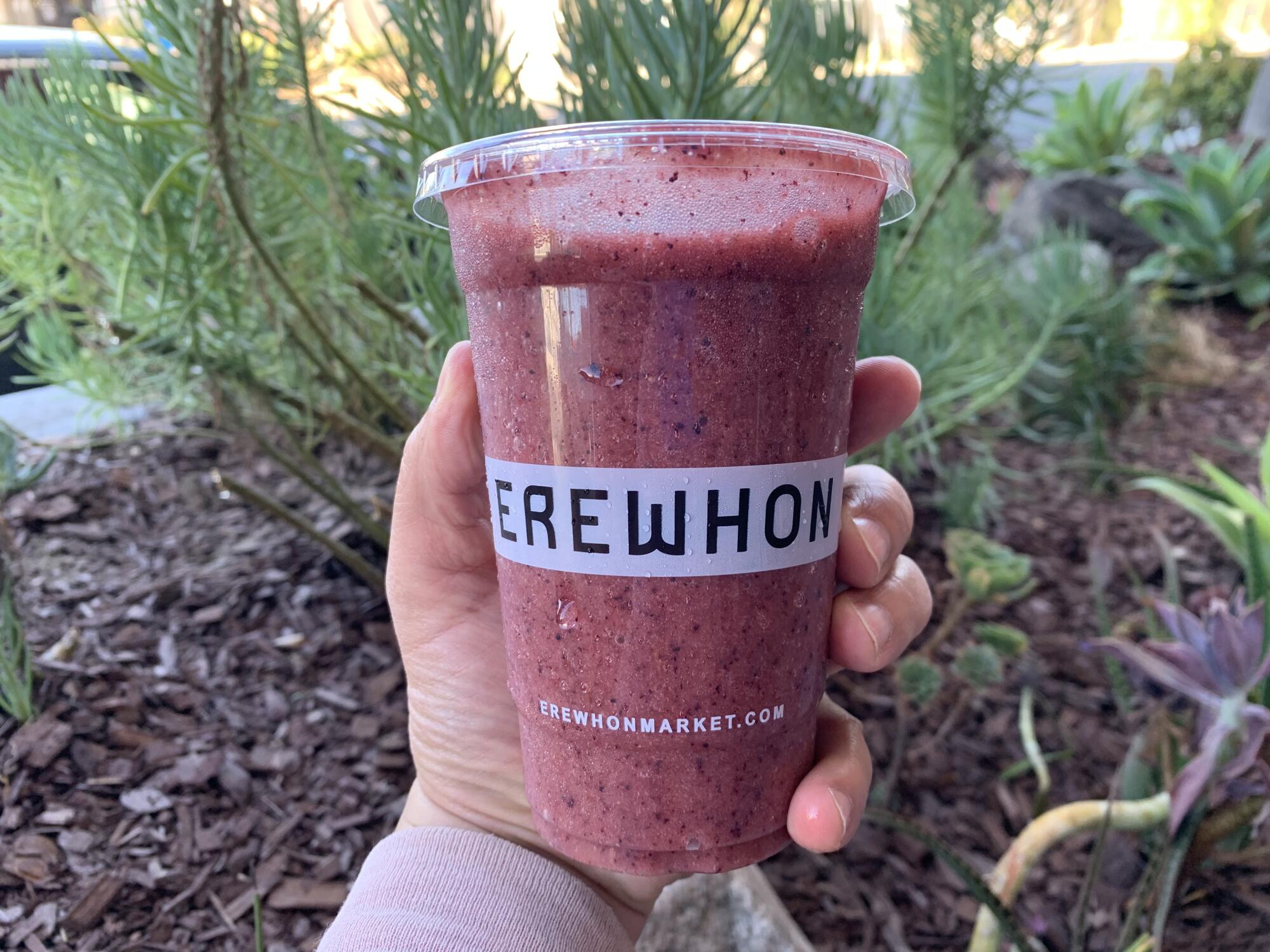
There’s a Twitter meme that goes, “Banana to the other fruits when you add it to a smoothie” and then shows a guy beating the crap out of four or five other guys at the same time. That is the Banana Rule, one that proclaims that when blended with other fruits, banana nearly always reigns supreme.
That’s not a problem per se, but it’s certainly the case here. There are other fruits present — blueberries and strawberries — but they take a back seat to king banana. This is a decent smoothie overall, though: Priced at $12, it’s the closest to what you might get from your neighborhood Jamba Juice. Just much more expensive.
Strawberry Probiotic
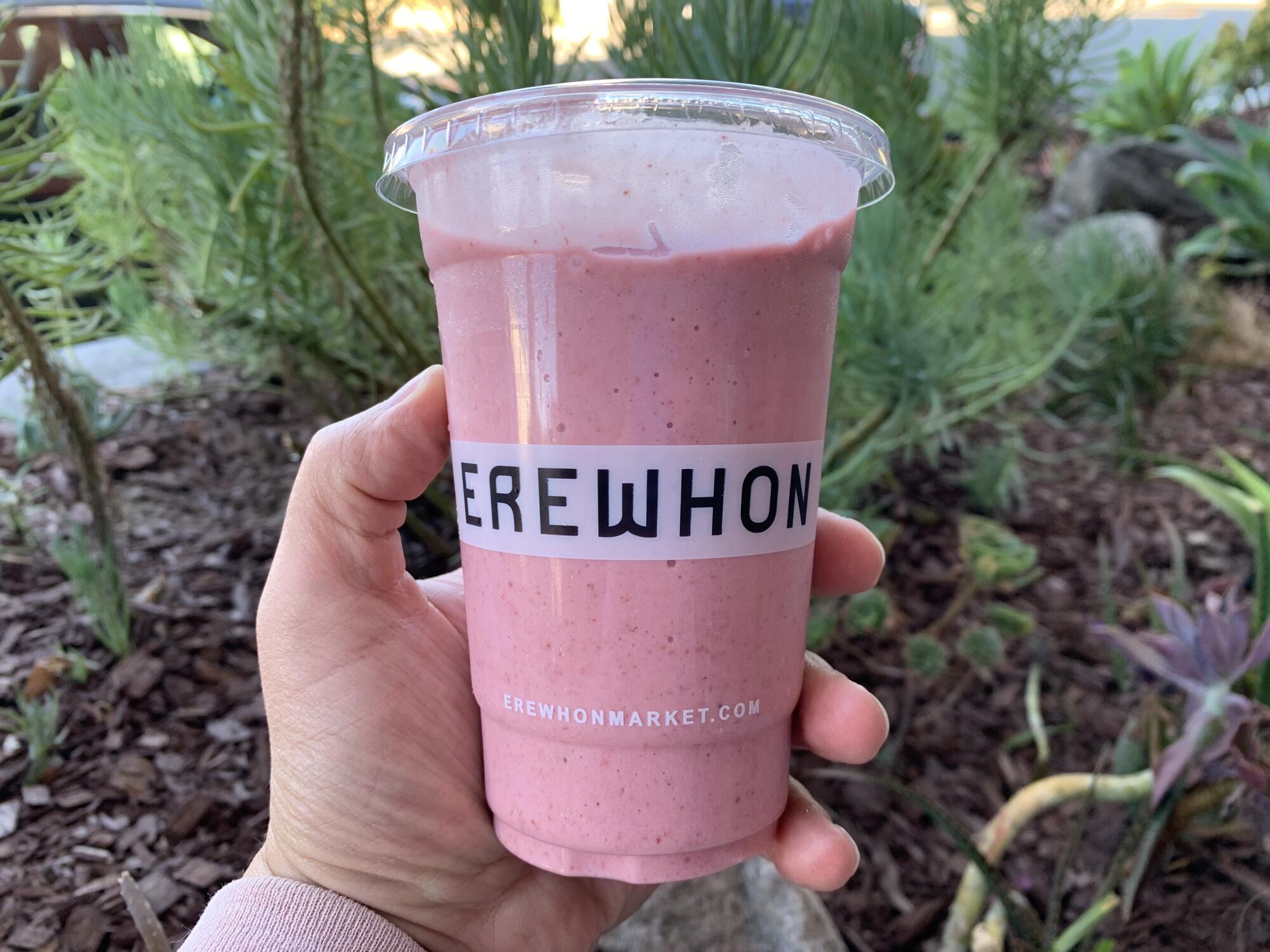
At least half of the name is correct: There’s not much strawberry flavor to this at all. But Erewhon’s most expensive smoothie ($21) does have the tart sourness of a Yakult beverage. What Yakult has, though, is a kind of balancing citric sweetness that makes it drinkable, if not downright tasty. This just tastes like a cup full of enzymes, but fans of plain yogurt will find some pleasure here. Sorry, I’m still in shock at the price tag. Twenty-one U.S. dollars!
The Rest
Energy Elixir
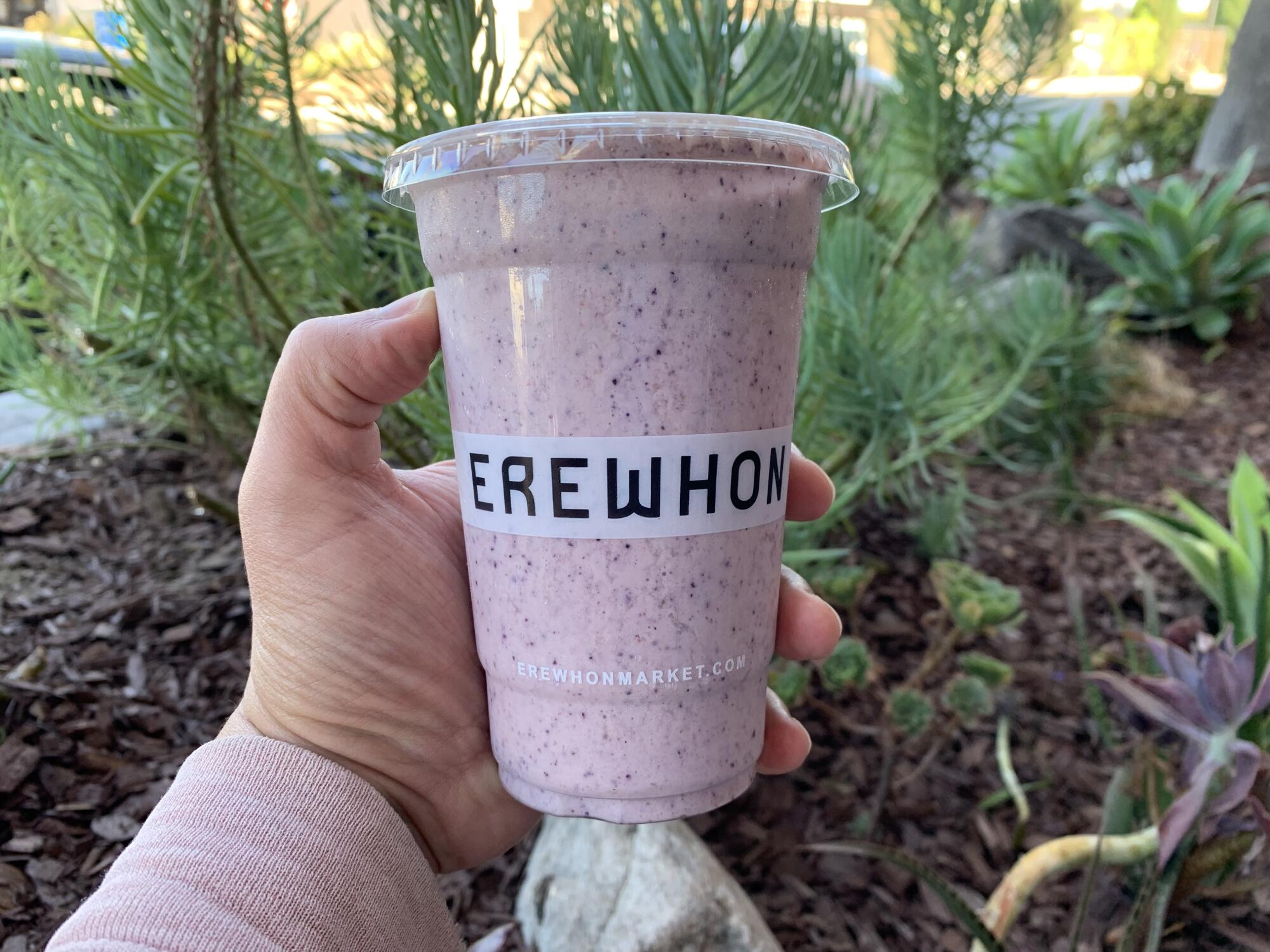
This isn’t bad, just odd. There’s no there there. Priced at $13, it’s a thin pap with a vague hint of banana and berry, like a lightly flavored almond milk. This makes Kevin Costner look like an ebullient charisma machine. (Sorry, sorry. I realize a lot of people like “Yellowstone.”)
Kefir Margarita
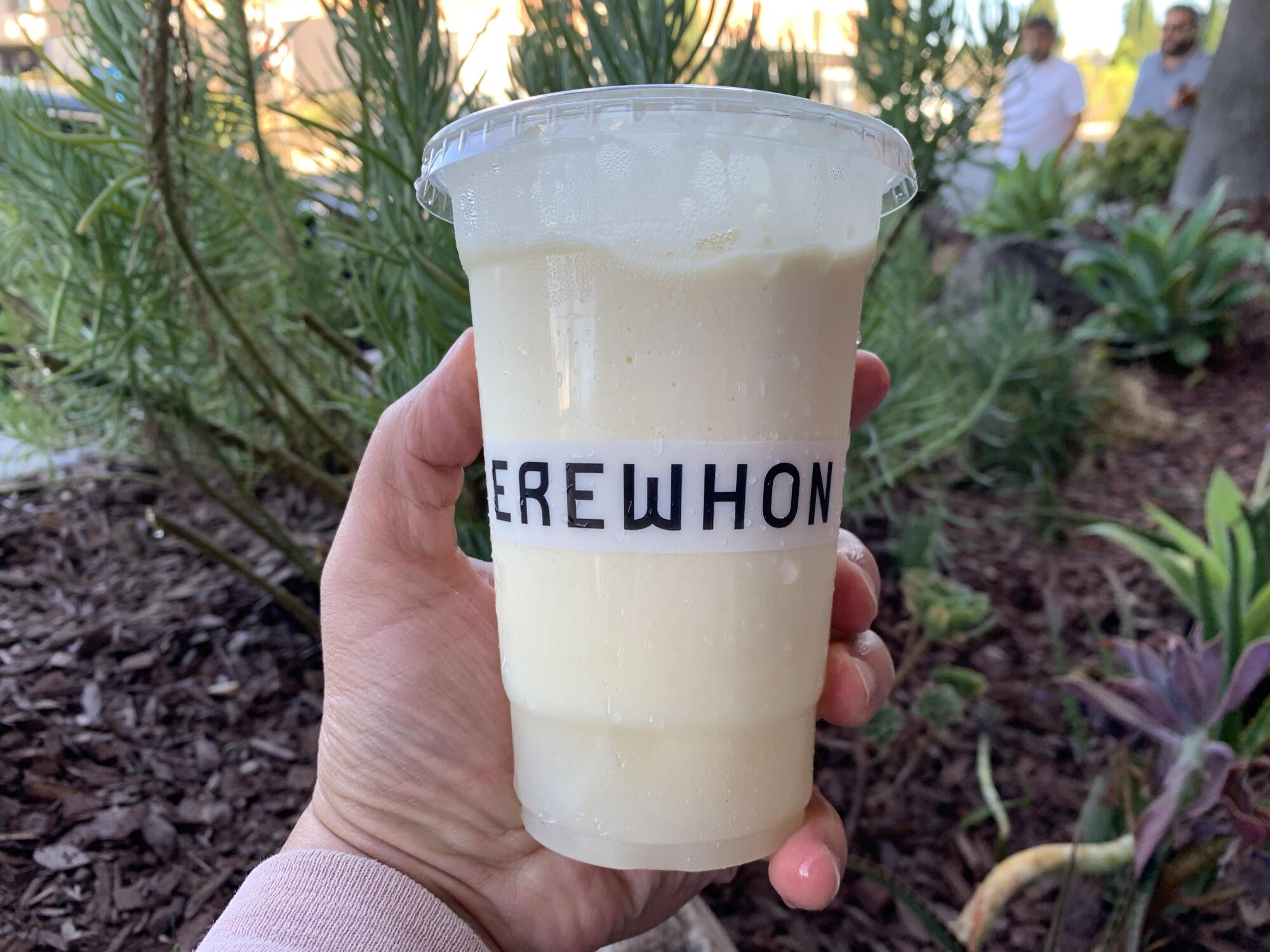
I appreciate what they’re trying to do here — create a citrusy mixture with a fun, slushy texture — but this $16 smoothie doesn’t work. The culprit is the stevia sugar substitute. Erewhon uses stevia in a number of its smoothies, and usually it’s not a problem when it’s masked by assertive flavors and textures like banana or avocado.
Here, though, there’s nowhere for the stevia to hide. The result is a watery, sour mixture with a powerful, cloying aftertaste. I don’t recommend this.
Maca Bomb
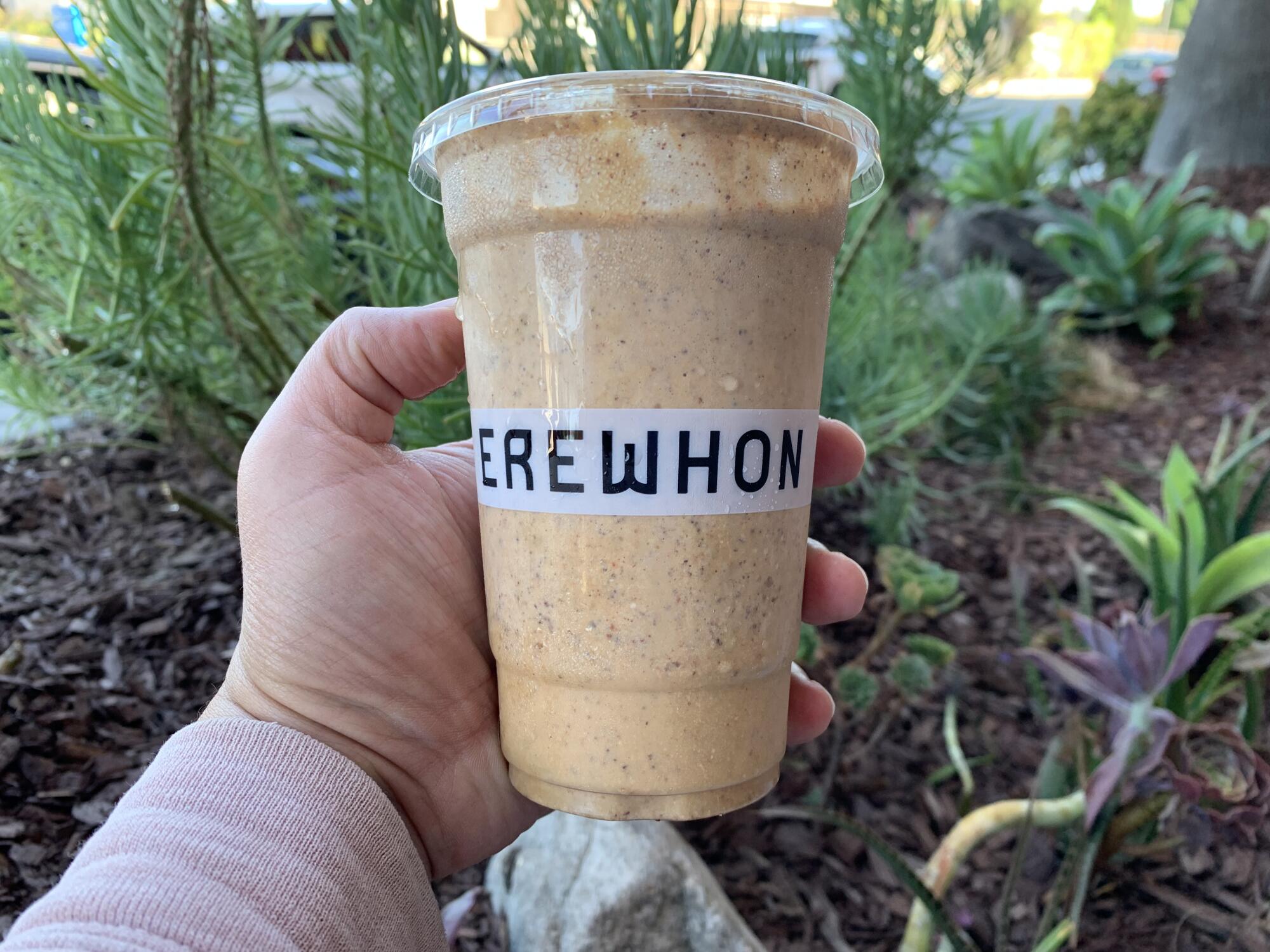
There’s a nice burnt sienna color (my favorite Crayola crayon growing up) to this $18 smoothie, but my main complaint is how nubby and gritty it tastes. I like to chew a drink as much as anyone, but I also don’t want to have to carry floss with me wherever I go. I’d dial back a bit on the seeds, nuts and cacao nibs, because it feels a bit like drinking the bottom of a French press pot.
Mint Chip Energizer
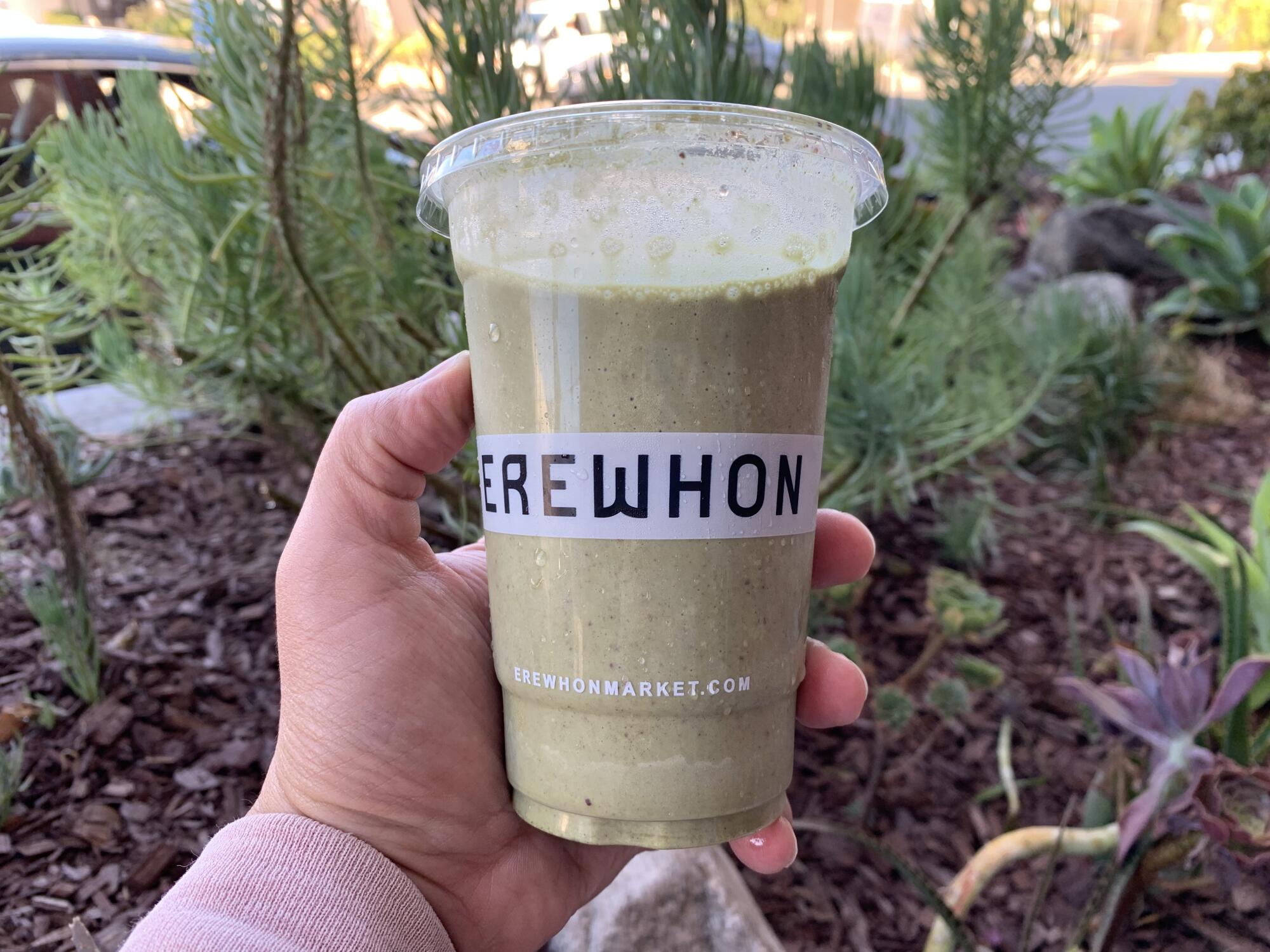
My immediate response to this $16 smoothie was, “the dirt around the mint plant in your herb garden.” There’s a hint of that clean, bracing mint flavor here, but it’s really just a suggestion. The main notes are woody and reedy, like the part of the artichoke you’re supposed to throw away. Not nearly as refreshing as the name would suggest.
Regenerada
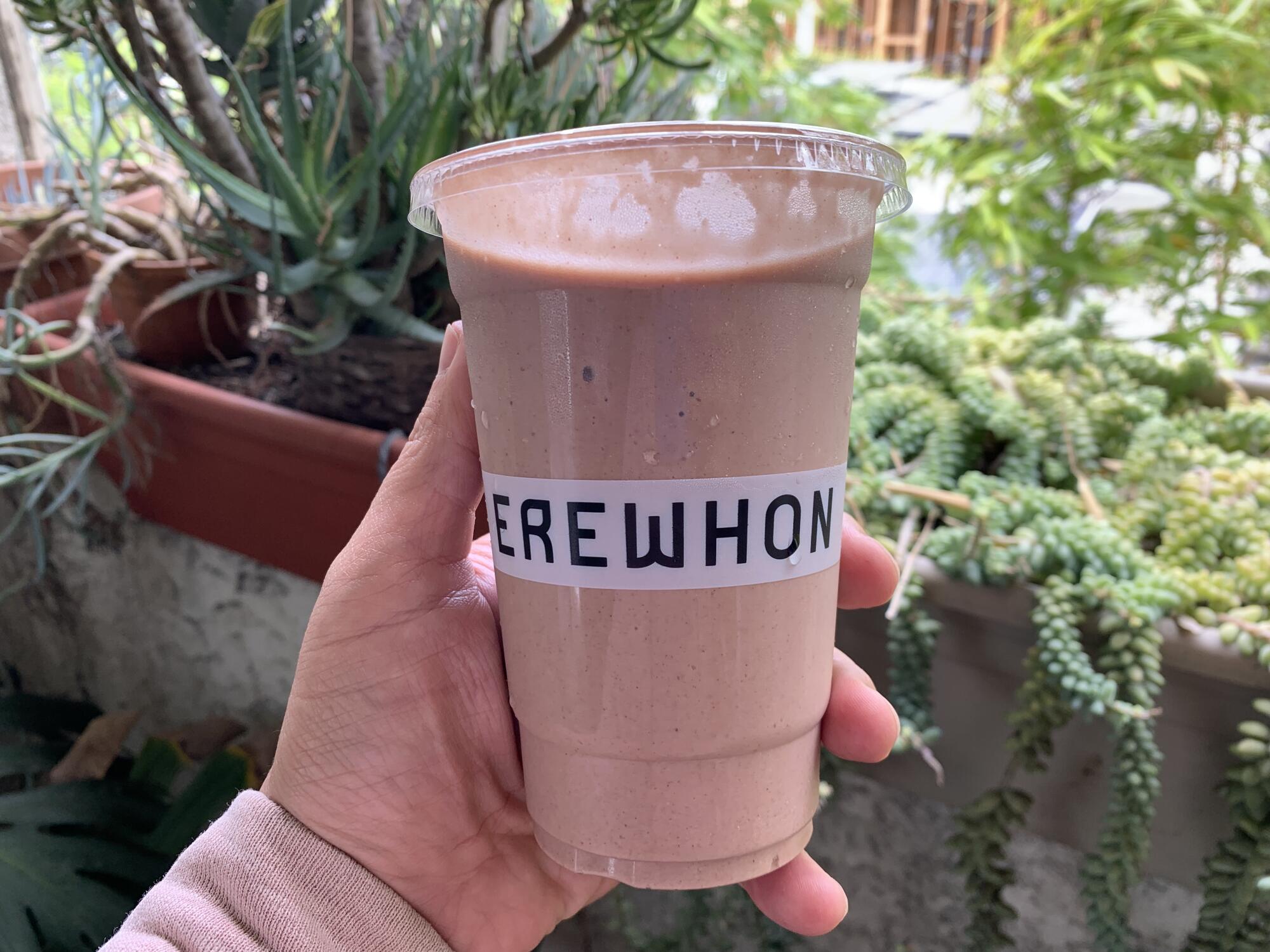
I may occasionally want a clay face mask on my face. But I rarely want to consume a clay face mask, which is how I felt when drinking the $13 Regenerada smoothie.
A dry, dusty stickiness overwhelms any other flavors here, which are mostly almond and banana, resulting in an unpleasant protein shake. This had better have some extreme health benefits, because I don’t see many other reasons to drink it.
Rishi Key Lime
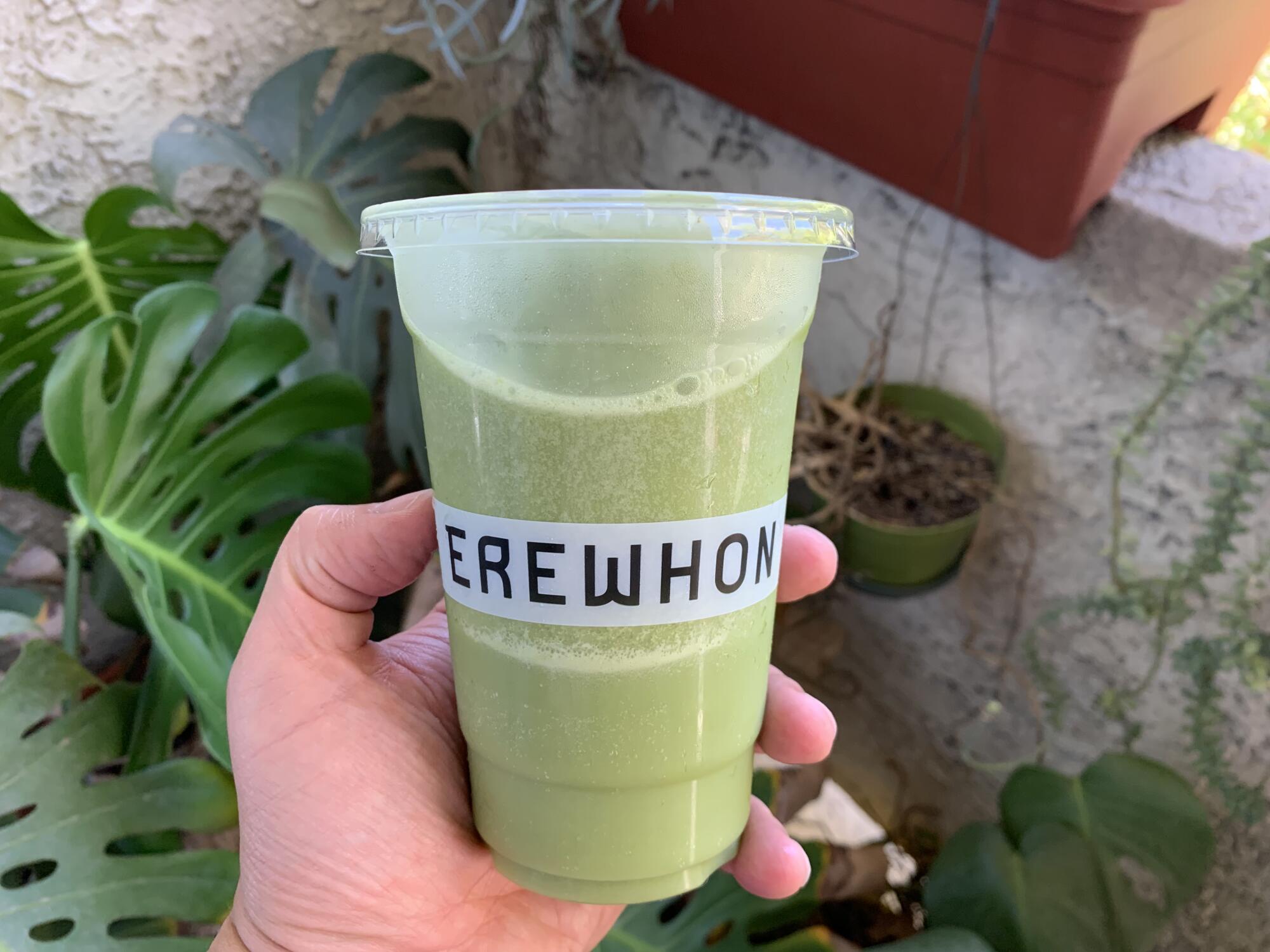
This $12 item fails for largely the same reasons as the Kefir Margarita smoothie. It can be hard to stick the landing with citrus in a smoothie, and Erewhon is no Simone Biles. The stevia imparts an awful, lingering saccharine sweetness that commands attention from other flavors. The inclusion of matcha feels, as with the Matchacado smoothie, somewhat haphazard and badly planned.